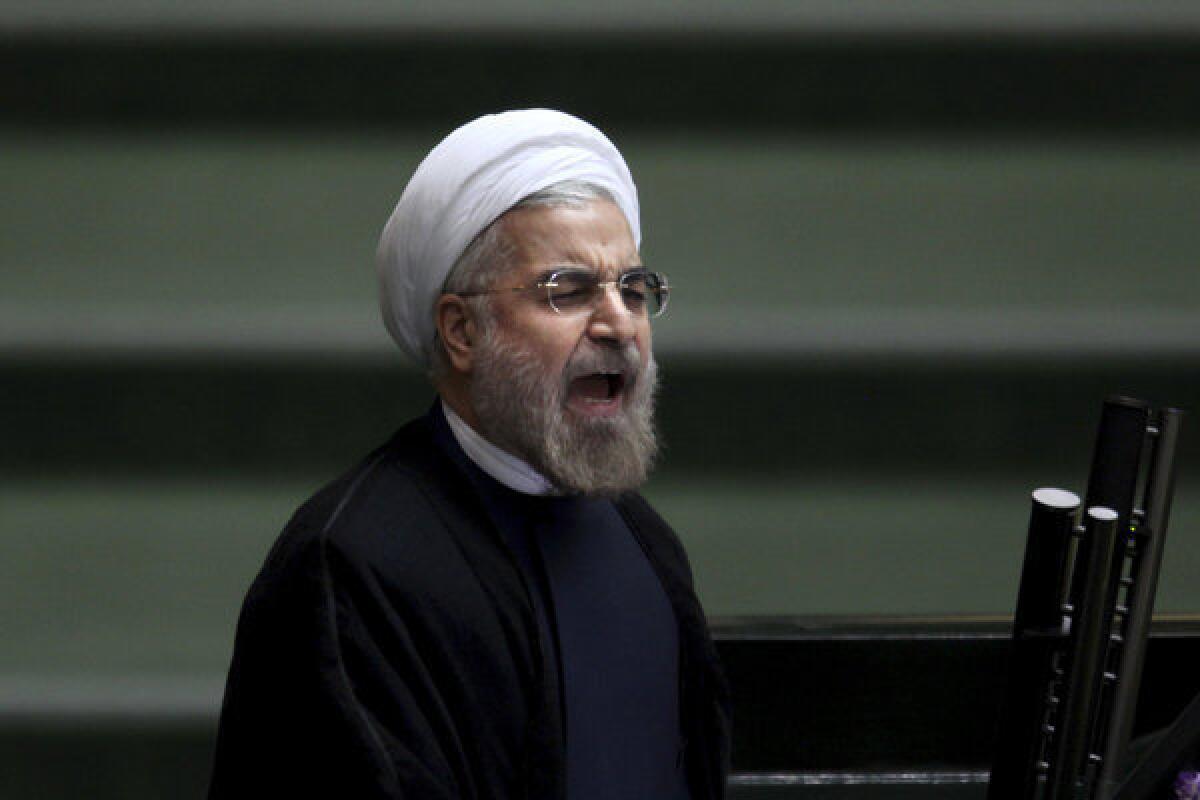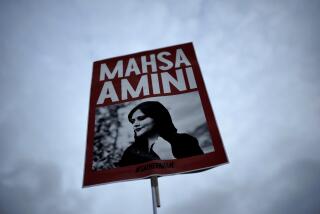New Iran president wins approval for most Cabinet choices

TEHRAN — Iran’s parliament handed a victory Thursday to new President Hassan Rouhani, approving 15 of his 18 proposed Cabinet ministers, including nominees to head the key ministries of oil and foreign affairs.
The vote culminated four days of often rancorous discussions that were nationally televised. The debates represented a rare public airing of problems besetting the Islamic Republic, including corruption, economic malaise and environmental woes. Iranian officials lauded the proceedings as an example of transparent democracy at work in a region where political tumult and violence have dominated recent headlines.
Most of the nominees are veterans of the Iranian political system, having served under former presidents Ali Akbar Hashemi Rafsanjani and Mohammad Khatami, both considered mentors of Rouhani.
The new Cabinet members are expected to be key players in Rouhani’s plans to improve relations with the outside world, revive Iran’s financial outlook and push to roll back Western sanctions that have battered the economy.
The three nominees who were rejected were Rouhani’s picks for relatively minor posts, in the ministries of education, science and sports.
The nomination process was the first major challenge facing Rouhani, who was inaugurated Aug. 4 and promptly submitted his Cabinet choices.
Rouhani, considered a moderate, was elected in June in a surprise victory that highlighted many Iranians’ desire for change and an improved economy. Himself a former parliament member, he succeeded Mahmoud Ahmadinejad, who served two four-year terms.
Among those receiving a vote of confidence from lawmakers Thursday was Mohammad Javad Zarif, a U.S.-educated former ambassador to the United Nations who is the president’s choice for foreign minister. Many observers in the West welcomed the nomination of Zarif, who is generally seen as favoring renewed engagement with the United States and Europe.
Critics in parliament, which is dominated by hard-liners, wondered aloud why Iran should have a foreign minister on good terms with Washington and other Western capitals. Zarif told lawmakers it was better to be respected by one’s adversaries.
Also passing parliamentary muster was Bijan Zanganeh, the president’s choice for oil minister, a post Zanganeh held under Khatami. Detractors sought to link him to corruption in the oil sector, but Zanganeh countered that he did everything he could to prevent bribery and other misconduct.
As oil minister, he faces a major challenge in marketing Iran’s principal export at a time when sanctions -- over Iran’s controversial nuclear development program -- have made it difficult for Tehran to sell petroleum abroad. The U.S. Congress is considering more sanctions targeting Iran’s oil and other sectors.
Some critics said several of Rouhani’s nominees were too old — the average age is close to 60 — or too “Westernized,” a reference to the fact that many studied in the United States or Europe. Rouhani himself holds a doctorate from a British university.
Defenders of the presidents’ nominees said their foreign degrees highlighted their qualifications for government service.
Mohammad Ali Najafi was rejected as minister of education; Jafar Milimonfared as minister of science, research and technology; and Masoud Soltanifar as minister of sports and youth.
During the debates, the education and science nominees were accused of participating in the massive street protests that followed the disputed 2009 presidential election, which gave Ahmadinejad a second term. Both men denied any role in the demonstrations and said they had only sought to calm down the volatile situation. The proposed sports minister was criticized as lacking expertise for the post.
Rouhani will now have to submit new nominees for the three positions.
ALSO:
Death toll in Egypt crackdown hits 525
U.S. seeks extradition of Mexican behind DEA agent’s death
Soccer World Cup 2018 host Russia is asked to explain anti-gay law
patrick.mcdonnell@latimes.com
Special correspondent Mostaghim reported from Tehran and Times staff writer McDonnell from Beirut.
More to Read
Start your day right
Sign up for Essential California for news, features and recommendations from the L.A. Times and beyond in your inbox six days a week.
You may occasionally receive promotional content from the Los Angeles Times.






